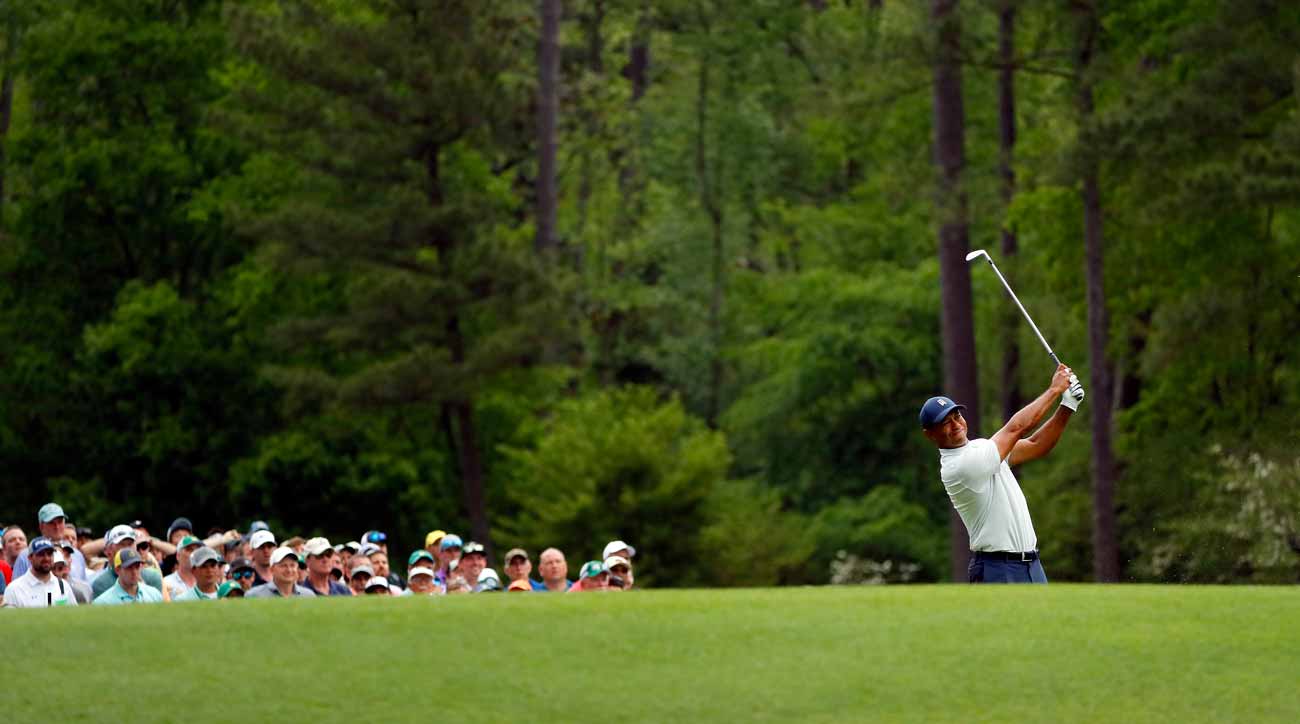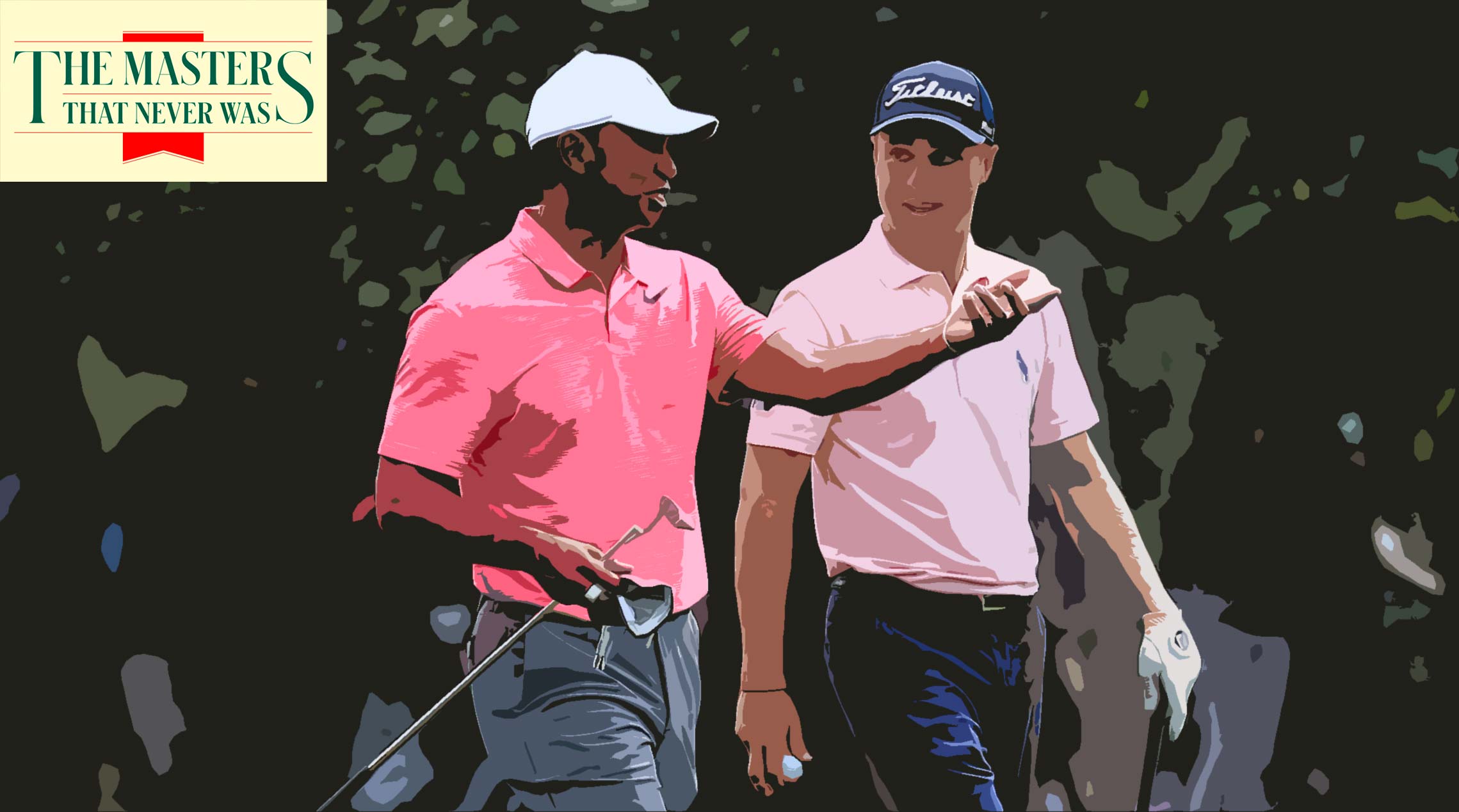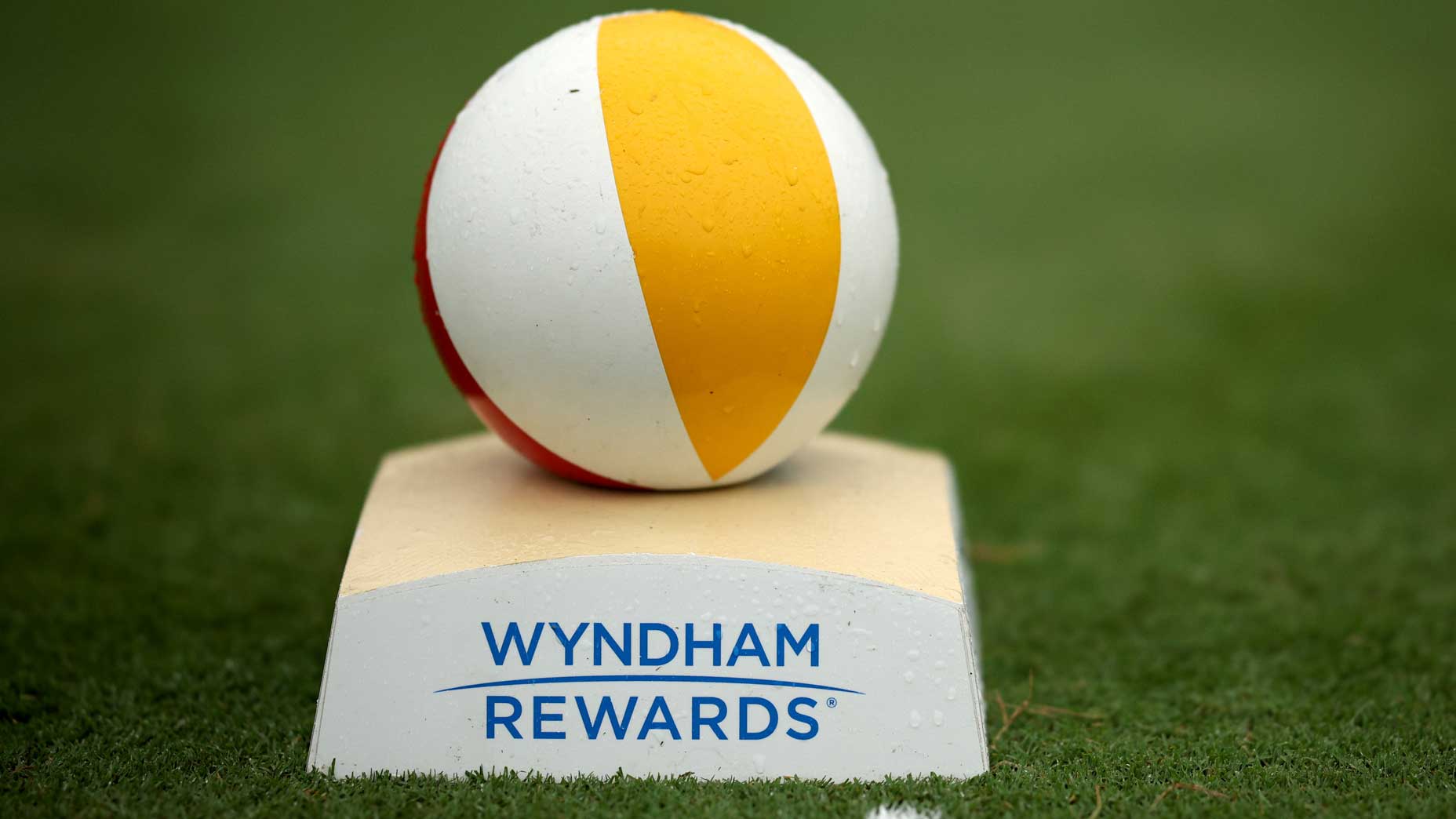 2025 CJ Cup Byron Nelson payout: Purse info, winner’s share
2025 CJ Cup Byron Nelson payout: Purse info, winner’s share
The man who died — and was reborn — at Amen Corner

Before we begin, consider this my impassioned plea to listen to the below story in audio form via the Drop Zone podcast. That’s why we told this story — so you could listen to it! You deserve to hear Johnny Pruitt’s voice when he tells you a fantastical tale of life and near-death at Augusta National. But if you can’t listen (which you can do on iTunes or anywhere you find podcasts), we would of course still be honored if you read on.
Seeing Amen Corner in person is a top bucket-list item for plenty of golf fans. That’s how it began for Johnny Pruitt too — until it suddenly became far more than that. It’s where his life came to a screeching halt.
And where it then began again.
Johnny Pruitt grew up in Hanahan, a small town in South Carolina, where he learned to play — and love — golf from an early age.
“My golfing started with my dad, pretty much shagging balls,” Pruitt says. “And then he ended up sawing off one of his clubs, whittling it on down, I believe I was around 6 years old. And then I started hitting the balls back at him. And when I started hittin’ em over his head, he decided that there might be something he ought to do with me besides shagging balls.”
Like plenty of kids from the Southeast, Pruitt grows up watching and dreaming about the Masters. His first idol was Jack Nicklaus, but by the time he reaches his late 20s there’s another young upstart beginning to catch his eye.
“As I got older, the Tiger Woods show was a pretty, pretty good thing to watch,” he says.
So Pruitt is incredibly excited when a couple of his friends invite he and his wife to come to the 2018 Masters. Tiger’s playing well going in, so they’re all juiced up for an all-time day at golf’s biggest tournament. They pull into Augusta the night before, get dinner and get rested up.
“We had gone out the night before to LongHorn,” Pruitt remembers. “And I think I bought some Fireball, so, y’know, I was feeling pretty sporty that night.”
Pruitt and his crew have a great time, big Thursday night on the town. And they wake up the next morning raring to go. And that is really where our story begins.

I ask Pruitt: “What’s Augusta National like for someone who has never been there? What is the feel of the place? What does it look like?”
He pauses, then answers simply: “It’s heaven on earth.”
Pruitt and his crew make it through the gates, foldable green Masters chairs in tow. This speaks to one strange feature about attending a tournament at Augusta: You can leave your chair somewhere and then just come back to it later. It’s a placeholder. That’s the plan for Pruitt and crew: head down to Amen Corner, leave chairs, wander the course.
“We were carrying our chairs to the par-3 [12th] at Amen Corner,” Pruitt says. “We hadn’t gotten to our destination yet, where we were going to put the chairs. I was talking to one of my wife’s friends, the ones that invited us. I was having a conversation with him and he said that I started mumbling my words. I started stumbling and I stopped right in my tracks. And the next thing, he said, was I just went down like a tree fallen backwards.”

Johnny Pruitt is going into major cardiac arrest in front of a small crowd between the 11th and 12th holes at Augusta National. The serenity of the morning betrays the reality: His life is immediately in danger.
But luck (or an elevated number of physicians-per-capita on site — “luck” serves our purposes here) is on his side: A doctor appears as Johnny’s wife Christine is standing over him.
“He jumped on me and just started doing CPR,” Pruitt recalls. “And he says, ‘You’re gonna have to get some medical attention here!’
“They were just going to put me on the back of a cart and take me to their emergency tent. Well, the doctor that was on me says, ‘You just can’t leave him like that on the back of this cart. I’m going to have to get on this cart with him, do CPR, try and just keep him where we have the lungs and the blood moving and we use the Ambu bag to give him some oxygen — and one of y’all is going to have to drive.'”
By the time Pruitt gets to the medical tent, he estimates that 20 or 25 minutes have elapsed. He doesn’t have a pulse by this point. He was, to borrow his own words, “very much not alive.”
“I was turning blue,” he says.

At the medical tent, they restart Pruitt’s heart with an AED — a defibrillator. Then they rush him off to the Medical College of Georgia’s local hospital. His family has no idea where he is — there are no cell phones at Augusta, remember. At the hospital they X-ray his chest to try to figure out what’s going on.
“They said that my heart electrically stopped from an irregular heartbeat,” Pruitt says. “I’m 53 years of age at that time, we go to the hospital, I get two stents that day. They hook me up, they do the hypothermia thing, where they cool your body down.”
Left with no other options, the medical staff puts Pruitt into a coma.
“I think all they wanted working was my brain, my heart and my lungs,” Pruitt says. “They could care less what else — those are the vital organs that you need.”
While Pruitt is under, things get even more complex. He’s got a bridge holding some fake teeth that gets sucked into his lungs.
“Well, it broke loose, and when it broke loose it went into my right lung,” he says. “So there’s teeth in my right lung that they’ve got to somehow get out. With me sucking in those fake teeth, they were afraid I was going to be susceptible to pneumonia.”
But after seven days, miraculously, he opens his eyes.
“The fella that took the breathing tube out, I told him to stop for a second and I looked over at him and I said, ‘Man! That was one f—- up movie.’”
At this point, Johnny’s memory of the weeks preceding have vanished completely. He doesn’t remember walking through the gates at Augusta National. He doesn’t remember going into cardiac arrest. He certainly doesn’t remember Patrick Reed coming up 18 that Sunday nor slipping on the green jacket.
In the weeks that follow, Johnny undergoes the first of his many surgeries. He’s still in Augusta. And after a couple false starts, he gets scheduled for a procedure to put stents into place.
“It was Father’s Day, I remember, because I was in the hospital for like five days, and watching Phil Mickelson run to the ball and hit it at the U.S. Open. And that’s where I lost all the respect in the world for Phil.
“I go, ‘I know the rules. And you can play exactly by the rules. But I had never seen anybody do that, in all my years of watching golf.’”
Mickelson rules violations aside, the stents work wonders. Weeks later, Pruitt undergoes a surgery that cuts his resting heart rate, which had been sitting north of 130, down into the 60s. He’s finally able to go home. He faces an uncertain future; by this point, he’s been released from his job at a concrete plant. He’s worried about his insurance. But he starts to ease back into things.
“Then it was time to get my stuff together, to start finding out what mind and body was going to be able to do to get me back to work.”
Pruitt continues his comeback. He’s doing cardiac rehab, working out his heart, getting stronger, bit by bit. I ask him: When did he start feeling like himself again?
He lets out a long, audible sigh.
“I don’t think you ever find yourself again.”

ADVERTISEMENT
At home, Johnny undergoes some serious lifestyle changes.
“Now, I’ve been working out. I’ve got a stationary bicycle that’s sitting right beside my recliner. Maybe not the prettiest thing in the living room, but if I see it, I’ll get on it. I try and do anywhere from 10 to 20 minutes a day.
“I went from a 36 waist and I’m a 32 now,” he says. “I lost probably 40 pounds. I was probably 209, I think I got as low as 169. I’m about 171 right now.
It’s 2019 now. Johnny’s made it through months of unsteady progress. Some days are good. Others not so much. And then, in February, his wife comes to him with an offer.
“My wife came and told me, ‘Johnny. We’ve got an invitation to go back to the Masters…’ You know, because that had been my wife’s first time. Right when we went in, I had the cardiac arrest, so she never even got to witness the tournament.
So I said, ‘Well, Christine, I don’t know if I would be ready to do that. Give me a day or two to think about it.’”
Pruitt is worried: what will his body be able to take? But eventually, he decides he wants to go back. They have tickets for Friday of the Masters again, and they retrace their steps from the year before.
“We spent the night up there, we kind of did the same ritual we did the first time, we went to LongHorn again,” he said. This time? No Fireball.
Things start to get emotional on Friday morning, Johnny says, on his way over to Augusta. He’s got a pacemaker this year, so they allow him separate entrance onto the grounds.
“They go, ‘We’ve got a line specially made just for you,’ Pruitt remembers, laughing. “And I go, ‘After what I went through last year they ought to have a damn line for me.’
“So they get me all through. And then the chills start to hit me. I held together pretty good, for a while. But then, later, we went to the site where I dropped.
“My sister was with us, but she did not go to the site. She said she couldn’t handle that. But me, my wife and the two fellas that were with us the year before, we went over to the site and then we said a little prayer.”
What were Pruitt’s emotions, I wonder? What was his experience like then being at Amen Corner in that same consequential place a year later?
“Grateful. Grateful. Yeah, just grateful to be alive and being able to experience that again, especially with my family being in there. Because they were the backbone of what got me to where I was at, too. It just it wasn’t just me.”
Johnny sits and watches from Amen Corner, taking in the action. Eventually Tiger Woods comes through. He flags his approach shot at the difficult par-4 11th, then pours in his birdie putt to get to four under. It’s one of just one of a handful of birdies on the hole that day.

A light drizzle intensifies, but Pruitt hardly minds. It’s a cleansing spring rain, washing away the events of the year prior, ushering in the new.
Then Woods steps up to the 12th tee, just feet from where Johnny’s sitting. He sticks it to 5 feet.
As Tiger’s group heads towards the green, the horn sounds: play is suspended. Johnny and others huddle under a shelter and, after some small talk, he shares his story with a few people in the crowd. One of those people is New Yorker writer Nick Paumgarten, who is putting together a deep dive feature on what he calls the “cultish dreamworld” of Augusta National. Here’s what he writes about Pruitt:
At one point, a young man told me, “My uncle dropped dead last year on eleven. This is the one-year anniversary of his death.” Then the uncle introduced himself. Johnny Pruitt, age fifty-four, from Bluffton, South Carolina. He’d gone into cardiac arrest in the gallery and was out for twenty-five minutes before paramedics revived him. The family were gathered here to celebrate his resurrection. “I bow down at Amen Corner,” he said. “I had goosebumps coming through the gate this morning.”
As Pruitt talks to more people during the delay, he finds himself thinking a lot about his past year — and about Tiger.
“It was just kinda fitting, how he was making his comeback and here I was trying to make mine. It just coincided together.”
As they wait for play to resume, Johnny discovers that something else has changed from the year before, too: something that could have easily meant the difference between his life and death. Something that now might make that difference for someone else.
As it turns out, Dr. Michael Farrell, the gastroenterologist who had saved Pruitt, had found a way to get a hold of Augusta chairman Fred Ridley. In an email, he offered praise for the responders on the cart and in the medical tent, and said he was ecstatic and amazed that Pruitt had survived the acute myocardial infarction. But the intent of his letter was clear: Farrell was making an impassioned plea for AEDs on every first aid response cart.
To his credit, Ridley took the note seriously. Here’s what he wrote back:
Dear Dr. Farrell,
Thanks very much for your email and for the critical assistance you provided, which very likely saved Mr. Pruitt’s life.
Thanks, also, for your suggestions regarding our procedures in situations like this. We strive to improve in every area of operations affecting anyone who is part of the Masters Tournament and I can assure you our procedures will be thoroughly reviewed in light of this situation.
Again, thank you for reaching out on this. I am glad you enjoyed the tournament.
Best regards,
Fred Ridley
“There was not an AED on the crash cart that came to me,” Pruitt says. “Now, the next year, I went to one of the crash carts, and I talked to one of the technicians, and he was like, ‘well, we’ve got AEDs on all our crash carts.’
Friday night, Johnny and his friends head home, but they’re still following the action intently. Sunday morning, Johnny is in his living room, and he can’t believe his eyes as his favorite golfer pulls off the unthinkable.
What was that like, I ask Pruitt, to watch his win — both as a Tiger fan and as someone making a comeback in parallel?
Another deep sigh.
“As you ask the question, the chill bumps hit me,” he says. “And that’s what was happening when it happened. You just…you go to another place. It’s like golfer’s heaven. How ‘bout that?”

Before the coronavirus disrupted every corner of American society, the Masters included, Johnny Pruitt and his friends had another plan for this year: Augusta LongHorn on Thursday night. Masters Friday. That return will have to get put on hold for another year. For Johnny, that’s okay. After last year, he’s confident he’ll be around for many Masters to come.
“This was this was an eye-opener, to say, ‘You got to take care of your body,’” he says. “Your body is you. If you don’t take care of it, it’s gonna take care of itself for you. And it probably not going to do a very good job.”
It’s not just that Pruitt survived his incident at Amen Corner. He didn’t just live to fight another day. In his mind, nearly dying at Augusta National actually saved his life, opening the door for decades ahead with his beloved wife Christine and their teenage daughter.
So what does the most famous corner of the world’s most famous golf course mean to him now?
“Well, I look at it two ways in one breath. It was almost my burial. And then it was my uplifting.”
To listen to the Drop Zone, follow wherever you listen to podcasts: iTunes | Spotify | Soundcloud | Stitcher


To receive GOLF’s all-new newsletters, subscribe for free here.
ADVERTISEMENT







